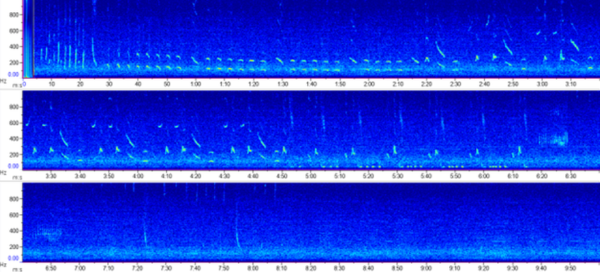A potential migratory corridor for north Atlantic humpback whales has been identified off the coast of Northern Ireland, Ireland and Scotland through a wide-ranging study of whale song.
Male humpback whales produce complex, structured, culturally transmitted songs. Scientists working on the multi-agency Collaborative Oceanography and Monitoring for Protected Areas and Species project (COMPASS) have detected humpback whale song in our regional waters primarily between March and May. The COMPASS project has been funded and supported by the EU’s INTERREG VA Programme, managed by the Special EU Programmes Body.
The Agri-food and Biosciences Institute (AFBI) and Queen’s University Belfast (QUB) PhD student Cathy Gibson explains that the purpose of the whale song is thought to be associated with breeding behaviours and can often be heard on tropical breeding grounds, but it is now well established that song is also detected all the way along the migratory route as well as on traditional feeding grounds.
Our regional waters potentially form part of the migratory corridor of north Atlantic humpback whales from two populations, those that breed at Cape Verde off west Africa, and those that breed in the Caribbean Sea.
Photo of the humpback whale song spectrogram
The Marine Mammal team at AFBI, led by Dr Suzanne Beck detected the species off the north coast of Northern Ireland. Dr Beck observes that “Humpback whale song was unexpectedly detected during the springtime at two coastal monitoring sites; the Skerries and Causeway Special Area of Conservation, and Malin Head in County Donegal.
Humpback whale song can be detected up to 10’s of kms away but this can vary based on water depth and the frequency of the song units, so the whales could be at least 10km from the acoustic detectors and the main potential migration route further offshore.”
The work carried out by AFBI has benefited from a partnership with Scottish collaborators Scottish Association of Marine Sciences (SAMS) and Marine Scotland. The COMPASS project has received match funding from the Department of Agriculture, Environment and Rural Affairs (DAERA, NI), Department of Housing, Local Government and Heritage (DHLGH, RoI) and Scottish Government (Scotland).
Further information can be found here.
